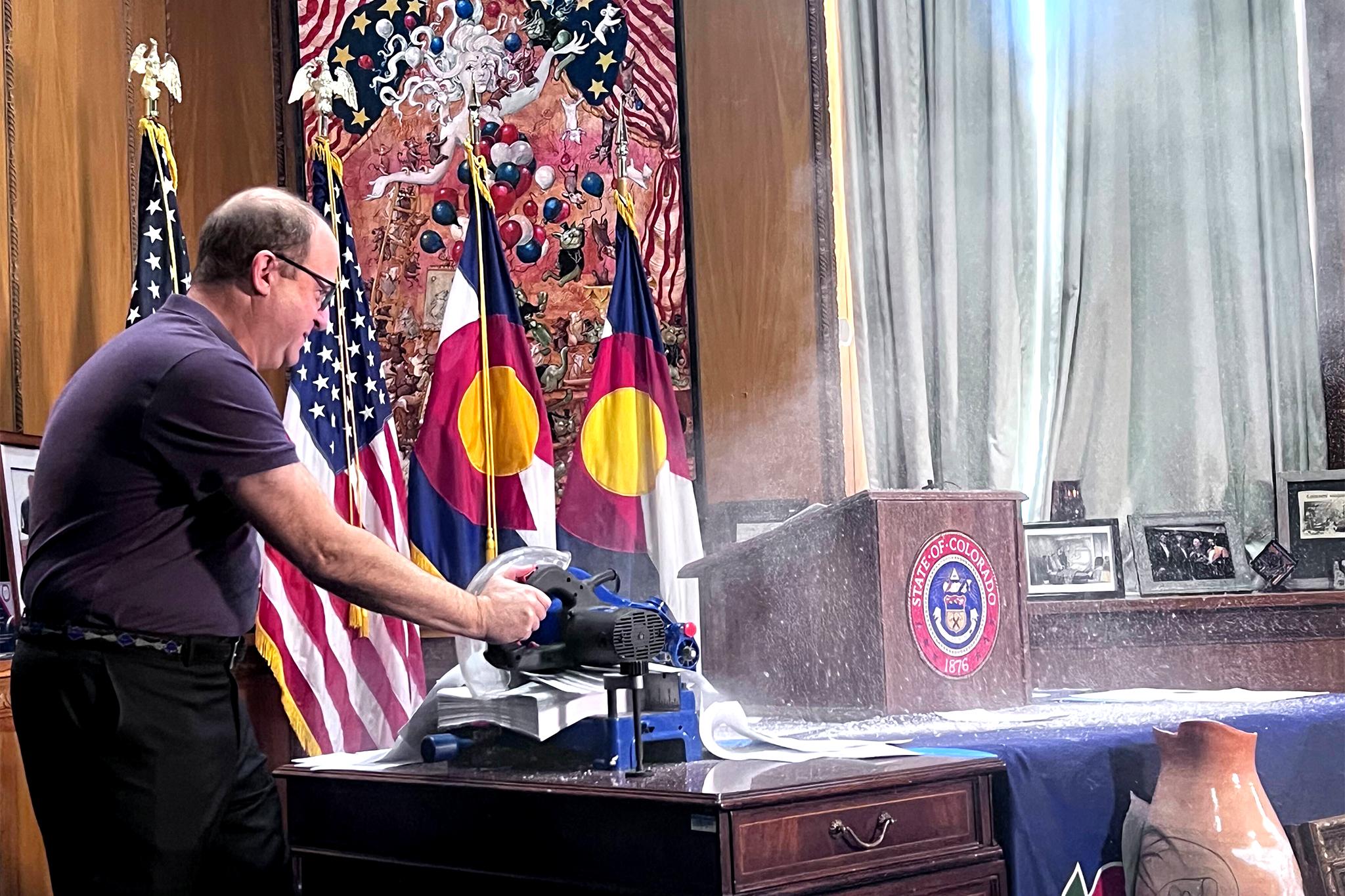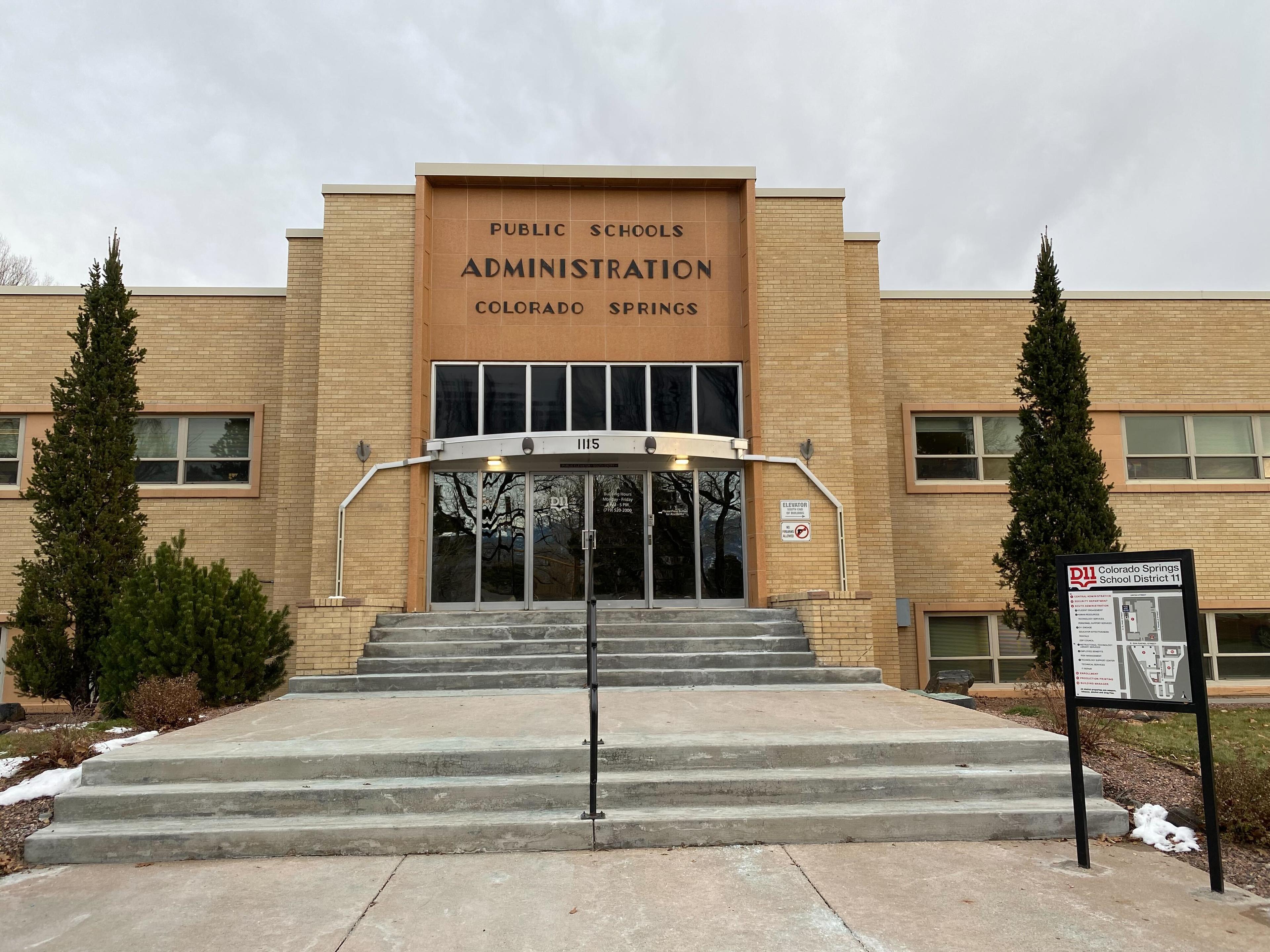The legislative session starts up in three weeks. In our regular conversation, Gov. John Hickenlooper fills us in on his priorities -- and potential problems. You'll hear Hickenlooper on:
His request for $12 million to lure new companies to Colorado
His concern about the 'bitterness' over new legislative districts
A 'likely' appeal of a court ruling that the state must spend billions more on public schools
And...his New Year's resolution
[Photo: Governor's Office]
Begin transcript:
RYAN WARNER, Host:
Governor, thanks for being with us again.
JOHN HICKENLOOPER, Colorado Governor:
Glad to be back.
Warner: House Majority Leader Amy Stephens, a Republican, recently summed up her agenda for Colorado Public Radio. She said, “Our agenda is jobs and the economy.” Without holding you to exactly seven words, can you give us a phrase that sums up your top priorities for the coming session?
Hickenlooper: Well, I'd say, jobs, jobs, jobs and education reform, healthcare.
Warner: Okay.
Hickenlooper: So, similar but different.
Warner: Can you give me a specific proposal you're hoping to see out of this session that could spur job growth?
Hickenlooper: Well, there are a number of things we've been working on. Ken Lund, who's our head of economic development, we announced two weeks ago, the Colorado Innovation Network. And the focus is how do you get more innovation, more patents into jobs.
And this is completely funded by the business community. They're going to have a multi-day conference next September and then have that fold into a web-based approach to take all 24 federal laboratories in Colorado, all the research laboratories at CSU and Colorado School of Mines, CU--
Warner: So this could be NREL, the National Renewable Energy Lab. This could be--
Hickenlooper: They're all going to-- they've all agreed. They're all going to come together and we're going to break down the silos and take the patents and ideas that could lead to businesses and tie them in with the business schools and then the young entrepreneurs in the business community.
Warner: This doesn't strike me as something you need support from the legislature for.
Hickenlooper: No, no, I think this is-- what we're trying to go to the legislature for is one of the related components, which is around economic development. So what we've talked about is replenishing the fund by which we convinced Arrow Electronics to move their global headquarters here.
It's a $20 billion a year company. Their CEO said in the next couple years they expect to get to $23 billion in sales. To get Arrow's global headquarters here we had to have a small amount of money, relative-- much smaller than New York or California or Florida would give. But we did need some money. That fund is completely depleted.
We've talked about a revolving loan fund to attract film and video creation here of $3 million and, again, when you're cutting stuff, it's always difficult.
Warner: And how much money needs to be replenished in that fund you talk about? Where would that money come from?
Hickenlooper: Well, we're asking for $12 million for the economic development program, total.
Warner: Where is that money going to come from? How do you convince--?
Hickenlooper: Well, these $12 million is-- we're asking from the general fund.
Warner: Would you be asking for this money as you're potentially making more cuts to education?
Hickenlooper: We have seen an increase since the last budget forecast a couple months ago that we're going to have, probably, an additional $231 million for fiscal 2011-2012, which, I think, is going to allow us, between savings this year and then for next year, that we should be able to replenish all the cuts to education and, I think, also get the cuts we had projected for financial aid next year, to get rid of those as well.
Warner: At the college level?
Hickenlooper: At the college level, put $30 million back into that budget.
Warner: A legislative leader from your own party, the Democratic Party, this is House Minority Leader Mark Ferrandino, recently told us he expects the coming session to be a partisan bloodbath. Will that be the case?
Hickenlooper: Well, you know, I think my crystal ball is about as good at looking at the future political tenor in the legislature as it is-- as we've been at predicting the budgets, right? Predicting budgets is hard and predicting whether people get along. I do think -- and I've said this to Republicans and Democrats -- one of the reasons Arrow Electronics moved their global headquarters to Colorado was that we do collaborate at a very high level.
So, I think if the Republicans really are talking about jobs and really are talking about the economy and I think if the Democrats are really talking about jobs and the economy, they'll recognize that by finding the right compromises, we help define Colorado as a place that does things differently.
Warner: You talk about the tone, politically, and, you know, one thing that, I think, changed the tone was the very controversial reapportionment process, the redrawing of state and house boundaries. Republicans don't think they got a fair shake. You've said publicly that you were disappointed with the results of reapportionment.
First of all, do you agree that the process put the GOP at a disadvantage?
Hickenlooper: You know, I don't know whether anyone got an unfair advantage one way or the other. I do-- when I said I was disappointed, the bitterness that came out of it and also the number of sitting legislators who suddenly are going to have to be in a primary against another incumbent means that we're going to lose some good people, both-- and this is not just Republicans, but Democrats got combined into districts, as well. I find that to be regrettable.
Warner: Any changes you'd recommend in the process? They'd need a constitutional fix, right?
Hickenlooper: I wouldn't have a problem looking at a two-thirds majority. Say, for any map to be put to the judge, you need 8 out of 11 votes. I also thought that one thing that both Republicans and Democrats spoke strongly for was more competitive districts, which, right now, that's not in the language of priorities. They look at--
Warner: Keeping districts whole.
Hickenlooper: Keeping-- yeah, counties whole.
Warner: Counties whole, right.
Hickenlooper: Communities of interest. But I think it really helps the state to have competitive primaries and competitive elections, so having your reapportionment make more districts, both senate and house, more competitive, means that people will come out to primaries and will vote in the general elections if they're more competitive. I think that's good for the state, so--
Warner: Is that a change you'd fight for?
Hickenlooper: Yeah, I think that would be something to add. You still want to make sure you have strong support for communities of interest, but I think making competitive districts is a valuable addition to the language.
Warner: You're listening to Colorado Matters. I'm Ryan Warner and we're at the Capitol for our regular discussion with the governor, John Hickenlooper.
To another issue that's likely to be very big this session. It involves a court case called Lobato versus Colorado. It's got big financial implications. The judge in this case recently ruled that Colorado's school finance system is unconstitutional because there isn't enough money to make it thorough and uniform for all students.
The plaintiffs estimate Colorado will have to spend $2 billion to $4 billion more every year on schools to comply. Will you appeal to the Colorado Supreme Court?
Hickenlooper: I think it's highly likely we will appeal, just because I think we need to get resolution rapidly. We don't want uncertainty and people right now aren't sure who trumps whom and where does this all come out and I think we would likely -- again, this isn't decided. But here I am talking too much. You always do this, Ryan. You just drag out this stuff from me.
I think it's highly likely that we would go directly to the Supreme Court and get this resolved rapidly so that people know what-- how we operate and that there is some level of predictability.
Warner: Meantime, you're working with a group called TBD Colorado. It's called that because you couldn't think of a name -- to be determined.
Hickenlooper: Well, but TBD-- but it's also because we're talking about the future of Colorado, which is net yet determined.
Warner: Which is to be determined. I see. It's got a little meta meaning.
So, this group, TBD Colorado, made up of education leaders, business leaders, community leaders, political leaders looking at possible ways to increase school funding.
Hickenlooper: Actually, that's not true.
Warner: No?
Hickenlooper: We've never--
Warner: Have I narrowed it too much?
Hickenlooper: We've never discussed that. The real point of what we talk about with TBD Colorado is to look at the future of Colorado, but not to look at how do we get more money into or out of the system. I think explicitly we've said we want to be non-partisan and, as much as possible, we want to talk about, you know, in successive months imagine that we went to every state senate district around the state--
Warner: Okay.
Hickenlooper: --and had a town hall meeting and asked them, what's it mean to be a Coloradan? What are our core values? What do we share?
And then they came back a month later, for another two-hour meeting and talked just about education. And give real, non-biased facts to people. And the next month, talk about education-- or healthcare. And the month after that, talk about transportation. I mean, we have 123 bridges that are going to be non-usable in the next dozen years, the next 10 to 12 years, and our funding doesn't come close to it.
Well, if we want to address it, rather than just having a small group of people in Denver say, we need a new tax, let's look at every possible funding source, some of which aren't going to be tax increases, and say, what do Coloradans who believe in their state, what do they want to see happen in all these issues? And it's not just about getting more money, it's figuring out, do we need real money, do we need more money? Is that a real problem?
Warner: But you are certainly talking about areas in which quite a few people think more money is needed -- education, transportation. So, let me put this in rather gross terms. Is this TBD idea, are they kind of developing what Madison Avenue would develop, a way to talk to people that is convincing--
Hickenlooper: No.
Warner: --that they should raise taxes, that they should--?
Hickenlooper: No. Wrong. Wrong, wrong, wrong. The question is, people come back from these blue-ribbon panels on all these issues and say, we need all this money. Instead, I think what should first happen is go out to people and say, let's look at the condition and how can we improve the state of transportation, of healthcare, of education or higher ed, without any more money?
Warner: But that crumbling bridge?
Hickenlooper: No, no, no, no. Wait, wait, wait, wait. Ryan, Ryan, Ryan--
Warner: Take me to that crumbling bridge.
Hickenlooper: I'm taking that crumbling bridge and I'm going to say, is there a way to look at fixing that bridge that doesn't take so much money or do we really need that bridge.
Let's-- before we start writing checks, let's look at our healthcare system, and see how much we're wasting on, you know, Medicaid and Medicare patients. How much can we save on each of these things before we start talking about more taxes?
You know, one interesting one in education, for an example, is a longer school day, right? So, in many places around the world, the longer school day is connected to more successful outcomes for their student achievement.
Warner: We've seen that in the KIPP schools, for example.
Hickenlooper: Lots of them. And you could stagger-- there are systems whereby -- or so it's been argued to me -- that you can stagger when the school-- when teachers come in so that not all the teachers come in right at the start of the school day. Some come in an hour or two later and stay later, so that you have study halls in that first hour and that last hour of school for a large number of the kids where individual teachers or teaching assistants can monitor and maintain order and make sure everyone's studying, but-- So, you still have the same amount of teacher work in the day, but the day is an extra hour and a half or two hours longer, right?
There's a reform that doesn't need new tax dollars, doesn't need additional money, and yet might have a significant outcome. Again, you'd have to work with our teachers and make sure that teachers see the benefit of this and work with them and figure out a way that it makes their lives better. But, you know, when I just anecdotally talk to some teachers, a lot of teachers would like to come in to school a little later and stay a little later. That would be something they would embrace.
Warner: Governor, thanks so much.
Hickenlooper: It's always a pleasure.
Warner: Democrat John Hickenlooper is Governor of Colorado. We speak with him regularly at the State Capitol. And we had one more question for him, whether or not he had a new year's resolution. Turns out he does.
Hickenlooper: I've always said-- there's always no more than five feet between myself and disaster and that's the distance from my foot to my mouth. So, one of my resolutions is to be a little more thoughtful before I speak. But, see, in answering your questions, I've already broken that resolution.
Warner: But what's an example where you put your foot in your mouth in 2011?
Hickenlooper: Oh, you know, luckily I have this incredibly short memory, so I can't really remember, but trust me, you won't have to look far to past broadcasts to find places where the foot has found-- there have been footprints on my teeth.
Warner: But it is true, that that's been something-- seriously, though, that that's been a learning curve in the first year of the job?
Hickenlooper: Absolutely. I mean, I think that when you're in the governor's chair and you really are trying to bring people together, right -- I think this necessity for compromise right now has never been greater and someone's kind of got to assume the role of a fair witness and is going to listen to both sides -- you can't speak too soon. You have to hold your opinion. If you get out there too soon in a polarizing discussion, you kind of poison the well and you leave yourself with less ability to find compromise and bring the two sides together.







